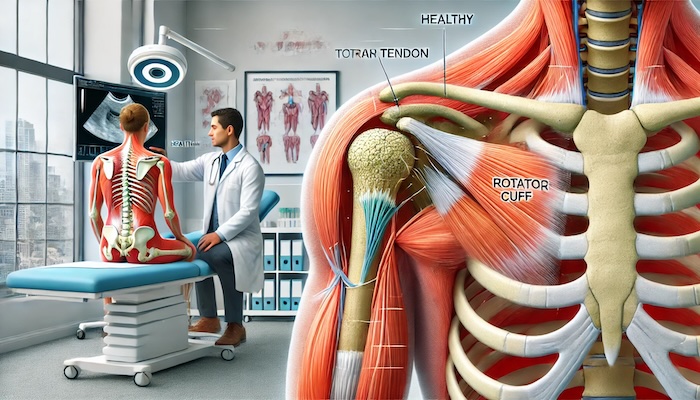
The rotator cuff is a group of four tendons and muscles that stabilize the shoulder and allow for a wide range of arm movements. A rotator cuff tear occurs when one or more of these tendons are injured, leading to pain, weakness, and limited mobility. This condition is common in both active individuals and older adults due to wear and tear or acute injuries.
Causes of Rotator Cuff Tears
Rotator cuff tears can result from various factors, including:
- Trauma: Sudden injuries, such as falls or accidents, can cause partial or complete tendon tears.
- Overuse: Repetitive overhead activities, such as swimming, tennis, or painting, can lead to gradual wear.
- Age-Related Degeneration: Tendon quality diminishes over time, making individuals over 50 more susceptible.
- Underlying Conditions: Shoulder impingement or chronic inflammation can predispose the tendons to tears.
Symptoms
Common signs of a rotator cuff tear include:
- Persistent shoulder pain, especially at night
- Weakness in lifting or rotating the arm
- Limited range of motion
- A cracking sensation during movement
Interventional Pain Management
At Precision Pain Care and Rehabilitation, interventional pain management offers non-surgical solutions to manage and treat rotator cuff tears effectively. These treatments aim to reduce pain, improve function, and promote tissue healing.
- Platelet-Rich Plasma (PRP) Therapy: PRP injections use the patient’s blood to deliver growth factors to the injured tendon, accelerating healing and reducing inflammation.
- Steroid Injections: Corticosteroids provide relief from acute inflammation, allowing patients to engage in rehabilitation.
- Physical Therapy Integration: Tailored exercises help strengthen the shoulder and restore mobility.
- Minimally Invasive Procedures: Techniques such as ultrasound-guided injections ensure precision and effectiveness.
When to Seek Help
Early intervention is critical to prevent complications such as tendon retraction or arthritis. If shoulder pain persists or worsens, consult an interventional pain specialist to explore options tailored to your needs.
Why Choose Precision Pain Care and Rehabilitation?
With expertise in advanced pain management techniques, the team at Precision Pain Care ensures comprehensive and patient-centered care. Non-surgical treatments like PRP and other minimally invasive therapies allow for faster recovery and long-lasting relief.
Precision Pain Care and Rehabilitation has two convenient locations in Richmond Hill – Queens, and New Hyde Park – Long Island. Call the Queens office at (718) 215-1888 or (516) 419-4480 for the Long Island office to arrange an appointment with our Interventional Pain Management Specialists, Dr. Jeffrey Chacko or Dr. Sonny Ahluwalia.













